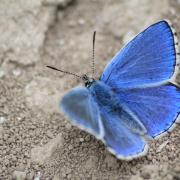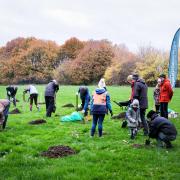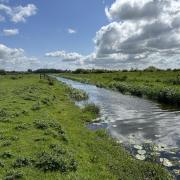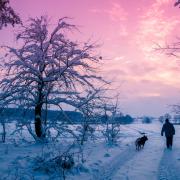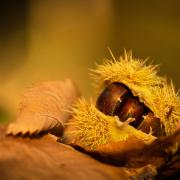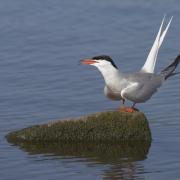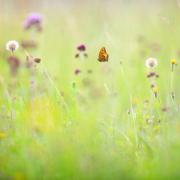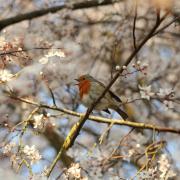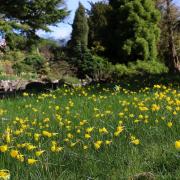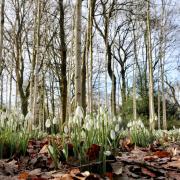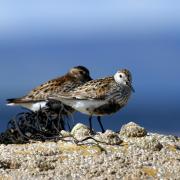There’s no time like the present to stand up for the natural world, writes Jen Shutt from Cheshire Wildlife Trust

Imagine you had a time machine. So many moments in time race through your head, but instead of going back, you decide to go forward to see what everything looks like in your home town in the year 2040. Not too far, but far enough to see how the garden’s developed and if you ever get that extension you’ve been saving for. You arrive, see your house and decide to meet the people who live there. You excitedly knock on the door and explain who you are and ‘when’ you came from. The reaction is frosty. Instead of the welcome and exhilaration you expect, are looks of judgement – ‘You’re from 2019?’
It’s hard for you to work out why at first. Of course, there are little differences, but each one does not seem that strange on its own. The air is dirtier, almost thicker - that must be why all the children have inhalers. The hubbub of vehicle noise is quite deafening now you hear. The park where you walked your dog has been replaced with a huge functional housing estate. You notice that a bush in ‘your’ garden that used to be covered in bees at this time of year is empty - in fact there are no insects. The hedge that used to belong to the farmer across the road has been replaced with a fence and you can see the field, full of cereals as far as the eye can see.
What happened? This could be the future of Cheshire if we do nothing.
Bringing ourselves back to 2019, on the surface Cheshire is ‘green’: a human dominated landscape, ancient habitats have been lost – what’s left are fragments of islands for nature. Not big enough to thrive, but nowhere else to go. Woods, meadows and ponds, homes for our wildlife, are getting smaller, fewer, more polluted and more isolated from each other.

Deep down you know this; when did you last see a hedgehog? When did you last hear an owl? Remember all those flies on your windscreen? These are more than just anecdotes; the facts are scarier. Since the 1930s, 66% of our barn owl population has now gone from our countryside, with 99% of our beautiful wildflower meadows also disappearing from our landscape since the 1960s. Those common frogs and water voles you used to see as a child have since seen a 90% decline since the 80s and 90s.
We need wildlife. Our natural world is valuable in its own right and is the foundation of our wellbeing; we depend on it and it depends on us. It is literally the air we breathe, the water we drink and the food we eat. It’s our wild gym, our therapy when we need a timeout and our cultural muse. Without a healthy natural world, the survival of humanity is at stake. By creating more space for nature, we can create a better world for people and wildlife.
The continuous pressures for food production, new infrastructure, housing, retail and developments are all having detrimental, long-term effects and we need to do something now.
Now is a once in a lifetime opportunity for our wilder Cheshire.

Whatever the politicians decide, as we prepare to exit the European Union, now is a critical time for a shake-up. It’s a once in a lifetime opportunity to influence the future of Cheshire’s natural environment for years to come. As we take control of our legislation from Europe, a strong Environment Act for England is vital if we are to reverse the trend of missing wildlife, setting out a plan for nature’s recovery and creating a healthier natural environment for us all.
In December, the Government started a process to create such an Act by publishing a draft Environment (Principles and Governance) Bill which sets out how we will maintain environmental standards. This is a great start, but doesn’t go far enough if we’re to genuinely tackle the serious environmental challenges we face. It lacks legal certainty for the future of our natural world. The Bill and Policy Note fall short in a number of ways:
The proposed green watchdog is too weak. What if the Government don’t do what they say they will? Currently the European Commission and Court enforce this. We need an independent watchdog, separate from the Government, that’s able to hold them to account, that has powers to issue fines if they fail to implement environmental legislation properly.
The Policy Note misses out Nature Recovery Networks. We need a joined-up network of wild areas that provide enough space for wildlife to recover and for our families to thrive – a Nature Recovery Network. We need to create a Nature Recovery Network that extends into every part of our towns, cities and countryside, bringing wildlife and the benefits of a healthy natural world into every part of life. Letting flowers bloom along road verges, installing green roofs across city skylines, planting more street trees to give people shady walks in the summer, encouraging whole communities to garden for wild plants and animals.
We’re disappointed that the Environment (Principles and Governance) Bill fails to propose key measures needed for this.
What we want, is for us all to be greeted at those doors in 2040 with the warm words: ‘You’re from 2019, the year that made a difference? Come on in.’
Together we can make a difference. Because if not you, then who?




